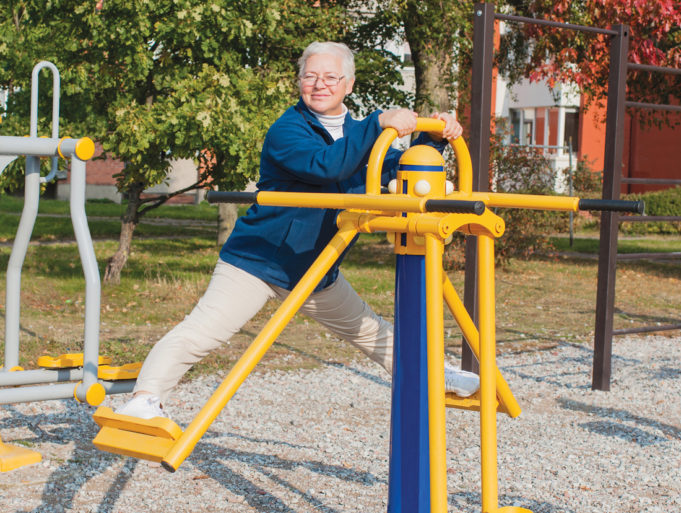As outreach and advocacy director for AARP, Carmel Snyder represents a population that rarely makes waves in Fort Worth City Hall. While limited food access and a lack in public transportation affect tens of thousands of Fort Worthians over the age of 50, pushing for public policy changes largely falls on her and her staff.
But she has made some headway lately.
In September 2014, Fort Worth joined AARP’s network of age-friendly communities, in which members pledge to pay increased attention to the “environmental, economic, and social factors that influence the health and wellbeing of older adults.”
Other Texas cities in the network include Dallas, Houston, and San Antonio.
Many of AARP’s potential projects, like creating age-friendly parks and meeting spaces, require considerable funding. Unbeknownst to Snyder, Regina Sobieski, foundation director for the health and wellness nonprofit NTSP Charitable Fund, was researching the possibility of funding the construction of a playground for seniors last fall. The outdoor spaces, sometimes referred to as outdoor adult gyms, include low-impact activities like stationary bikes, walking paths with ramps, and games like horseshoes. Though common in Western Europe and East Asia, they have been slow to catch on in the United States. The recreational areas provide opportunities for older adults to congregate, socialize, and use the equipment to maintain flexibility, balance, and stamina.
Through her foundation, Sobieski had allocated $250,000 for the project, but she needed help.
Last December, Snyder organized a meeting at Buon Giorno Coffee in downtown Fort Worth. Snyder invited Sobieski and David Creek, assistant director of Fort Worth’s parks and recreation department, to discuss the best path forward.
Creek said the proposed park aligns with his department’s plans. Rather than start from scratch, he advised adding age-friendly equipment to a park already set to be built. He said the final location for Fort Worth’s first age-friendly park has been narrowed down to one or two possibilities, but nothing has been finalized yet.
Snyder said the donation will be sufficient to cover the cost of the senior-friendly equipment. The rest would be covered by the city.
“While the city currently does not have an age-friendly playground, we did anticipate these as future needs. Our hope is to be able to have a ribbon-cutting on one, possibly two, of these in the fall of this year.”
Healthy aging is also a priority for Blue Zones Projects, a national program offered by Healthways, itself a for-profit wellness company headquartered in Franklin, Tenn. Blue Zones has benefited from considerable support by Mayor Betsy Price and other city officials. While city-endorsed Blue Zones slogans such as “Live Long, Better” adorn dozens of billboards and bus stop benches in town, Snyder said translating goals into results will require locating areas where seniors feel comfortable congregating and exercising.
“Playing on a playground is fun at any age,” she said. “Why should we stop when we are older? The equipment, which can be as simple as an oversized teeter-totter, helps seniors maintain flexibility, balance, and coordination. And it’s fun. ”
Adult playgrounds, she added, create an important space where older residents can freely mingle with children and young adults, lessening the feeling of isolation that sometimes accompanies advanced age.
Joel McElhany, infrastructure manager for the parks and recreation department, said he and his colleagues are working out the final details of the grant agreement between the city and NTSP. He anticipates City Council will vote in May to accept the grant. Construction on the playground, he said, could begin this summer.
The project may be one of the last Snyder oversees in Fort Worth. She recently accepted a new position with AARP in Oregon. While the playground project moves forward, Snyder said she still has concerns for Fort Worth’s older population that she hopes her replacement will advocate for. A proposed change to Fort Worth’s charter could replace public notices for events like budget hearings (currently published in the Star-Telegram) with online notices only. Many senior citizens do not have easy or consistent access to the internet, Snyder said.
Another unresolved concern involves public transportation. Many of Fort Worth’s bus stops are unprotected from the elements or overgrown with weeds.
“How comfortable is that to sit in?” she said.
City officials should ask themselves how age-friendly Fort Worth really is, she said. With advances in healthcare, people here and abroad are living longer. In fewer than 15 years, one in five people around the world will be over 65.
“Other countries have realized what we’re starting to realize,” she said. “When you integrate the aging population into the community, it keeps them feeling young and active.”












